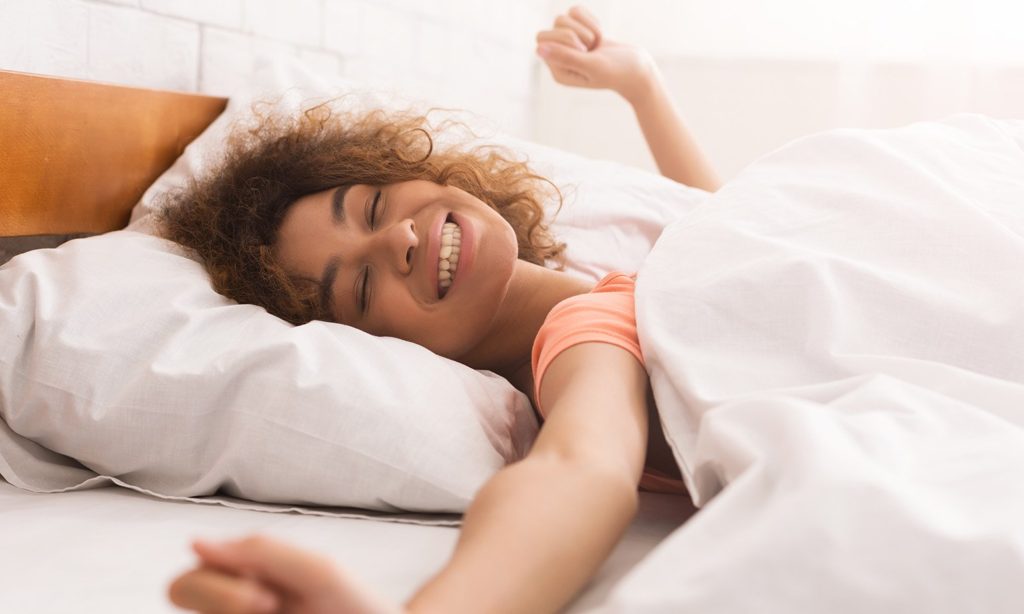Home » Fitness Blog » Solutions For a Better Night’s Sleep
Solutions For a Better Night's Sleep

We often focus a lot of our attention onto training and our nutrition when it comes to making positive changes to our health, and often forget to focus on the sleep and recovery section of our life. Im sure you have experienced the negative effects that a couple of bad night sleep have on performance, cognitive function and then the knock on effects to meal choices.
Having a sleepless night every now and then is normal, but if you frequently have trouble falling or staying asleep, then it’s worth implementing some strategies to help promote a good night’s sleep. Sleep deprivation can lead to short- and long-term health issues that can affect all areas of your life.
It’s no secret that the pandemic has affected our ability to relax. Stress about the virus combined with our inability to access the usual outlets that help us let loose and let off some steam can certainly make sleep more difficult, even impossible sometimes.
If this sounds like you, here are some proven non-prescription techniques to help you catch up on sleep:
At-Home Techniques to Help You Relax
Keep bed time consistent
One of the most consistently impactful habits to try and keep is having a consistent bedtime (within a 30min window each night), and trying to keep to this over the weekend. It’s also worth noting that simply forcing yourself to bed earlier when you’re not actually tired can have a negative effect on sleep. If you want to start going to bed earlier but you aren’t tired earlier then you need to do it in stages, bringing bedtime forward by 20-30 mins gradually over months.
Spend longer in bed
This is both pretty obvious and not always very helpful when work or family may not make it possible to do so. However its worth noting that if you are in bed for 8 hours that’s not equal to 8 hours sleep. So trying to get more time in bed (if it’s possible) might be impactful. Like the bed time consistency, do it in small steps, even if you can start by getting an extra 10 mins and then try and build on that over a period of months can help.
Turn your bedroom into a cave
Melatonin, a hormone that triggers sleepiness, is released when you’re in dark environments. Boost your chances of falling and staying asleep by making your room as dark as possible. Turn off all the lights and cover any bright gadgets, such as your alarm clock, phone, or computer. Better yet, remove all technology from your bedroom.
When evening comes, keep the lighting to a minimum throughout the house and consider using dimmer switches. To improve your sleep environment further, turn the temperature down to 15.5–20° C, which is the optimal temperature for your body during sleep.
Spend more time outside
Your circadian rhythm relies on daylight hours to know when to suppress or increase melatonin production. You can improve your circadian rhythm functionality by spending more daytime hours outdoors, where you will receive the maximum amount of natural light.
Exercise regularly
Exercise has a multitude of health benefits. A regular exercise routine not only helps improve your sleep quality, but it also keeps you more energized throughout the day. Increase your level of activity throughout the week with any type of exercise to help you fall asleep faster. High-intensity exercises should be avoided in the evening, but if the only time you can squeeze in a workout is right before bed, try low-intensity exercises, like yoga or resistance training.
Subscribe to my YouTube channel for workout advice and techniques.
Replacing Some Negative Patterns
Some of our natural evening routine can have a negative effect on our sleep cycle, switching these with healthier habits can help improve the quality and length of your sleep.
There are some recommended lifestyle changes that not only improve your sleep, but also your overall health, such as quitting smoking, reducing your alcohol and caffeine intake late in the day, and adding more exercise to your daily routine.
Examples:
- Reclaiming your bedroom: Instead of answering work emails on the bed or watching TV, try keeping your bedroom for only two things: sleep and sex. That means removing your TV and doing other activities (such as working, doing homework, exercising, or scrolling through your phone) in another room. Sticking with a bedtime routine, such as reading a book or meditating, and going to bed at the same time every night will tell your mind and body that it’s time to relax.
- Getting your body ready for bed: Don’t do anything close to bedtime that makes you alert. Certain habits like drinking caffeine past noon, looking at your screen close to bedtime, or working out late in the day can all affect your body’s sleep-wake cycle and suppress your body’s melatonin production.
- Finding ways to relax: There are many things you can do to encourage your mind and body to slip into a state of calm. Examples of relaxing activities include:
- Breathing exercises
- Taking a magnesium bath
- Hypnosis
- Meditation
- Listening to soothing music
- Avoiding work emails
Try Taking Suppliments
You can try adding certain foods or supplements to your diet that might help improve the functionality of your circadian rhythm, the process that regulates your sleep-wake cycle. Try adding:
- Melatonin
- Magnesium
- GABA (gamma-Aminobutyric acid)
- Serotonin
- Vitamin D
Like any supplements, I would strongly suggest focusing on other lifestyle factors before trying and it’s often worth consulting your doctor before starting any supplement regime.
For more advice on how to improve your sleep with online personal training, contact me today.


